What The Dickens?
I know writers are not supposed to admit something like this, but I confess, I have never been a fan of Charles Dickens. Certainly I thought A Christmas Carol was a lot of fun, with ghosts clanking about and showing us what Christmas spirit was all about, and without doubt, he was as much a social commentator as a novelist, but there it ends for me. One of my friends would read a novel by Dickens every summer, which as far as I was concerned, really would have made the best of times become the worst of times (that line courtesy of A Tale of Two Cities?).
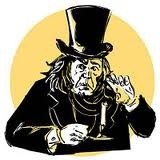
Cast adrift from my schooldays, I thought that might be the end of any relationship between myself and Dickens, apart from watching the odd remake of Great Expectations on either the silver or small screen. Then a few years ago, while looking up horse-related quotes, I came across the following, written by Monica Dickens: "Riding is a complicated joy. You learn something each time. It is never quite the same, and you never know it all."
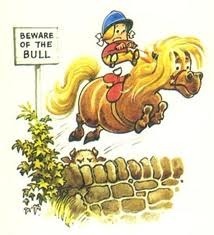
(Any excuse to add a Thelwell cartoon ....)
I loved those words from Monica Dickens immediately, not only because I love horses, and know intimately the experiences that inspire such a sentiment, but I thought it could also be applied to the process of writing, which led me to consider the many ways in which my two passions often run parallel – the writing and the riding. And I became interested in Ms. Dickens, great- grand daughter of Charles Dickens.
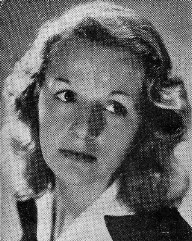
As you know – because it's the foundation of this blog – I do a fair amount of background reading and research to give color and depth to my series featuring Maisie Dobbs, and part of that is in reading fiction written in the middle years of the last century, from the 1920's to the 1940's. I do that to increase my awareness of language, of the way people spoke during the era – their vocabulary and rhythm of speech – and also to give some depth to my understanding of the mores of the time. Reading Monica Dickens has not only added to that understanding, but given me a fresh appreciation of a writer I knew just a little about – I had recognized her name because she wrote a column for a magazine my mother read when I was a child.
 With sharp skills of social observation and a wit as spiky as that of Jane Austen, Monica Dickens' work is now coming to the attention of a new generation of readers. Reprints of her novels and non-fiction are appearing, and I especially love the editions from Persephone Classics. I started delving into M. Dickens work again with her autobiographical One Pair of Hands, which is at once a comedy of errors and an incisive yet humorous insight into the lives of the more privileged between the wars.
With sharp skills of social observation and a wit as spiky as that of Jane Austen, Monica Dickens' work is now coming to the attention of a new generation of readers. Reprints of her novels and non-fiction are appearing, and I especially love the editions from Persephone Classics. I started delving into M. Dickens work again with her autobiographical One Pair of Hands, which is at once a comedy of errors and an incisive yet humorous insight into the lives of the more privileged between the wars.
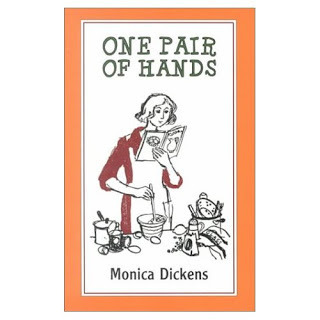
Monica Dickens was born to an upper class London family in 1915, and known as "Monty" to family and friends. She was expelled from the exclusive St. Paul's Girls' School, then later presented at court as a debutante. However, she threw all caution to the wind when she decided to broaden her worldview by becoming a servant, a "below stairs" employee – much to the mirth of her family, who by all accounts were used to her eccentricities. Those experiences became the foundation for One Pair of Hands. How she got away with it and managed to gain references for job after job is beyond me, with failed suppers, kitchen breakages replaced out of her own pocket, employers that ranged from shifty to accommodating, and the farcical open and closed door shenanigans she had to go though when she realized that the guest list for a country "Friday to Monday" at the house where she was working as a cook, included an old flame. One Pair of Hands is a wonderful, short read, but one that gives you the measure of Miss Dickens. She later became a nurse, and also worked in an aircraft factory – indeed her exploits mark her as something of a second generation Bright Young Thing, someone daring, but in a very down to earth way – and that's certainly expressed in her writing.
Having devoured One Pair of Hands, I wanted to read more of this palatable Dickens, so bought a copy of Mariana, a coming of age story that takes Mary, the heroine of the tale, from childhood to young married life, through the 1930's to second world war, when she awaits news of her naval officer young husband, who she fears might have lost his life when his ship was torpedoed. If you've read I Capture the Castle by Dodie Smith, this book is of the same ilk – but I enjoyed it much more. Dickens manages to make the often unlikeable Mary a character both strong and sympathetic at the same time – and gives an incredible insight into the lives of her characters at a time known for the changes wrought upon society.
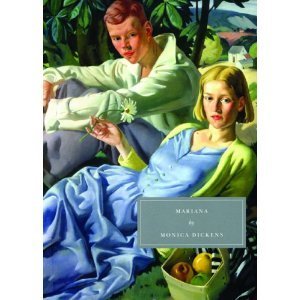
And to end this week's post, here's just one more Monica Dickens quote:
"Writing is a cop-out. An excuse to live perpetually in fantasy land, where you can create, direct and watch the products of your own head. Very selfish."
Uh-oh ... what do you think about that? I can see her point, but I'm not sure that I agree it's selfish any more than indulging any other passion (tinkering with cars, riding horses, gardening, playing golf). I feel very blessed to be a teller of stories, though sometimes that fantasy land is a very troubling place to be.
Next time: On Kindness ….
Published on November 15, 2011 07:28
No comments have been added yet.



